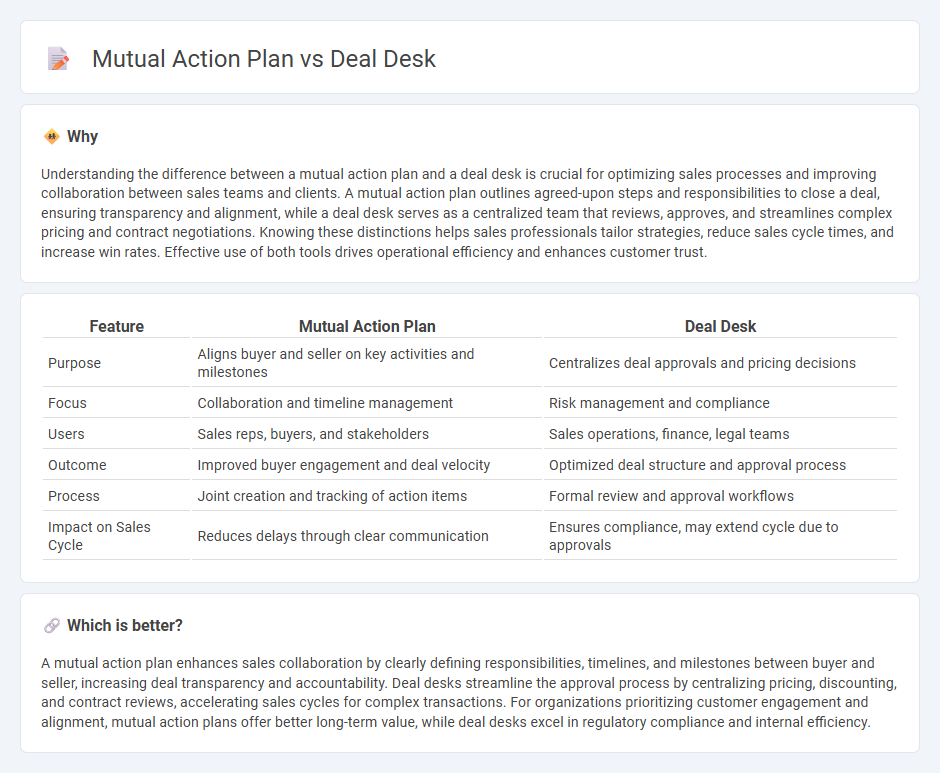
A Mutual Action Plan outlines a collaborative timeline between sales teams and clients, ensuring clear milestones and shared responsibilities throughout the sales process. In contrast, a Deal Desk centralizes deal approvals and pricing decisions to streamline complex transactions and maintain compliance. Explore how these frameworks can enhance your sales strategy and close deals more effectively.
Why it is important
Understanding the difference between a mutual action plan and a deal desk is crucial for optimizing sales processes and improving collaboration between sales teams and clients. A mutual action plan outlines agreed-upon steps and responsibilities to close a deal, ensuring transparency and alignment, while a deal desk serves as a centralized team that reviews, approves, and streamlines complex pricing and contract negotiations. Knowing these distinctions helps sales professionals tailor strategies, reduce sales cycle times, and increase win rates. Effective use of both tools drives operational efficiency and enhances customer trust.
Comparison Table
| Feature | Mutual Action Plan | Deal Desk |
|---|---|---|
| Purpose | Aligns buyer and seller on key activities and milestones | Centralizes deal approvals and pricing decisions |
| Focus | Collaboration and timeline management | Risk management and compliance |
| Users | Sales reps, buyers, and stakeholders | Sales operations, finance, legal teams |
| Outcome | Improved buyer engagement and deal velocity | Optimized deal structure and approval process |
| Process | Joint creation and tracking of action items | Formal review and approval workflows |
| Impact on Sales Cycle | Reduces delays through clear communication | Ensures compliance, may extend cycle due to approvals |
Which is better?
A mutual action plan enhances sales collaboration by clearly defining responsibilities, timelines, and milestones between buyer and seller, increasing deal transparency and accountability. Deal desks streamline the approval process by centralizing pricing, discounting, and contract reviews, accelerating sales cycles for complex transactions. For organizations prioritizing customer engagement and alignment, mutual action plans offer better long-term value, while deal desks excel in regulatory compliance and internal efficiency.
Connection
A mutual action plan aligns sales teams and clients by outlining key milestones and responsibilities throughout the sales cycle, ensuring transparency and collaboration. The deal desk supports this process by providing centralized oversight, facilitating deal structuring, pricing approvals, and compliance checks to accelerate deal closure. Together, they streamline sales operations, reduce bottlenecks, and increase forecast accuracy.
Key Terms
**Deal Desk:**
Deal Desk streamlines the sales process by centralizing contract reviews, pricing approvals, and discount management, enhancing efficiency and compliance across sales teams. It leverages automation and standardized workflows to reduce bottlenecks and accelerate deal closures, ensuring consistent governance and risk mitigation. Explore how implementing a Deal Desk can transform your sales operations and boost revenue performance.
Pricing Approval
Deal desks streamline pricing approval by centralizing deal review and ensuring consistent discounting policies, reducing revenue leakage and approval delays. Mutual action plans align sales and client teams on pricing milestones and approval steps, fostering transparency and accountability throughout the negotiation process. Explore how integrating deal desks with mutual action plans can optimize pricing approval efficiency and deal velocity.
Contract Review
Deal desks streamline contract review by centralizing approvals, ensuring compliance, and accelerating negotiation cycles within sales processes. Mutual action plans enhance contract clarity by outlining responsibilities, timelines, and deliverables, promoting transparency and alignment between parties. Explore more to understand how integrating both can optimize contract review efficiency and stakeholder collaboration.
Source and External Links
Deal desk explained: How does it help sales and finance? - A deal desk is a cross-functional team that manages, facilitates, structures, reviews, and approves complex sales deals, ensuring alignment with company goals, compliance, and profitability while supporting the quote-to-cash process.
What is a Deal Desk? - Salesforce - The deal desk is a centralized team that streamlines the closing of complex and non-standard deals by standardizing requests, coordinating approvals across departments (finance, legal, product, sales), and leveraging technology to accelerate deal closure.
What is a Deal Desk? - DealHub - A deal desk is a centralized, cross-functional team that approves and manages complex or non-standard deals, bringing together expertise from sales operations, finance, legal, product, and executive leadership to protect margins, ensure compliance, and speed up the sales cycle.
 dowidth.com
dowidth.com